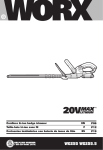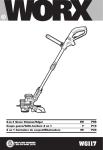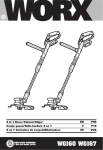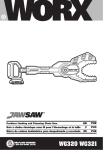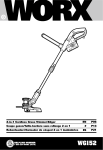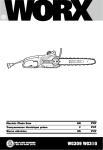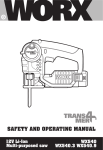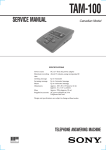Download Worx WX254L Instruction manual
Transcript
SAFETY AND OPERATING MANUAL Original instructions WX254 WX254.1 General Power Tool Safety Warnings WARNING: Read all safety warnings and instructions. Failure to follow the warnings and instructions may result in electric shock, fire and/or serious injury. Save all warnings and instructions for future reference. The term power tool in the warnings refers to your mains-operated (corded) power tool or batteryoperated (cordless) power tool. 2 1) Work area safety a) Keep work area clean and well lit. Cluttered or dark areas invite accidents. b) Do not operate power tools in explosive atmospheres, such as in the presence of flammable liquids, gases or dust. Power tools create sparks which may ignite the dust or fumes. c) Keep children and bystanders away while operating a power tool. Distractions can cause you to lose control. 2) Electrical safety a) Power tool plugs must match the outlet. Never modify the plug in any way. Do not use any adapter plugs with grounded power tools. Unmodified plugs and matching outlets will reduce risk of electric shock. b) Avoid body contact with grounded surfaces such as pipes, radiators, ranges and refrigerators. There is an increased risk of electric shock if your body is earthed or grounded. c) Do not expose power tools to rain or wet conditions. Water entering a power tool will increase the risk of electric shock. d) Do not abuse the cord. Never use the cord for carrying, pulling or unplugging the power tool. Keep cord away from heat, oil, sharp edges or moving parts. Damaged or entangled cords increase the risk of electric shock. e) When operating a power tool outdoors, use an extension cord suitable for outdoor use. Use of a cord suitable for outdoor use reduces the risk of electric shock. f ) If operating a power tool in a damp location is unavoidable, use a Ground Fault Circuit Interupter (GFCI) protected supply. Use of a GFCI reduces the risk of electric shock. 3) Personal safety a) Stay alert, watch what you are doing and use common sense when operating a power tool. Do not use a power tool while you are tired or under the influence b) c) d) e) f) g) of drugs, alcohol or medication. A moment of inattention while operating power tools may result in serious personal injury. Use personal protective equipment. Always wear eye protection. Protective equipment such as dust mask, non-skid safety shoes, hard hat, or hearing protection used for appropriate conditions will reduce personal injuries. Prevent unintentional starting. Ensure the switch is in the off-position before connecting to power source and/or battery pack, picking up or carrying the tool. Carrying power tools with your finger on the switch or energizing power tools that have the switch on invites accidents. Remove any adjusting key or wrench before turning the power tool on. A wrench or a key left attached to a rotating part of the power tool may result in personal injury. Do not overreach. Keep proper footing and balance at all times. This enables better control of the power tool in unexpected situations. Dress properly. Do not wear loose clothing or jewelry. Keep your hair, clothing and gloves away from moving parts. Loose clothes, jewelry or long hair can be caught in moving parts. If devices are provided for the connection of dust extraction and collection facilities, ensure these are connected and properly used. Use of dust collection can reduce dustrelated hazards. 4) Power tool use and care a) Do not force the power tool. Use the correct power tool for your application. The correct power tool will do the job better and safer at the rate for which it was designed. b) Do not use the power tool if the switch does not turn it on and off. Any power tool that cannot be controlled with the switch is dangerous and must be repaired. c) Disconnect the plug from the power source and/or the battery pack from the power tool before making any adjustments, changing accessories, or storing power tools. Such preventive safety measures reduce the risk of starting the power tool accidentally. d) Store idle power tools out of the reach of children and do not allow persons unfamiliar with the power tool or these instructions to operate the power tool. Power tools are dangerous in the hands of untrained users. e) Maintain power tools. Check for misalignment or binding of moving parts, breakage of parts and any other condition 3 4 that may affect the power tools operation. If damaged, have the power tool repaired before use. Many accidents are caused by poorly maintained power tools. f ) Keep cutting tools sharp and clean. Properly maintained cutting tools with sharp cutting edges are less likely to bind and are easier to control. g) Use the power tool, accessories and tool bits etc., in accordance with these instructions and in the manner intended for the particular type of power tool, taking into account the working conditions and the work to be performed. Use of the power tool for operations different from those intended could result in a hazardous situation. 5) Battery tool use and care a) Recharge only with the charger specified by the manufacturer. A charger that is suitable for one type of battery pack may create a risk of fire when used with another battery pack. b) Use power tools only with specifically designated battery packs. Use of any other battery packs may create a risk of injury and fire. c) When battery pack is not in use, keep it away from other metal objects, like paper clips, coins, keys, nails, screws or other small metal objects, that can make a connection from one terminal to another. Shorting the battery terminals together may cause burns or a fire. d) Under abusive conditions, liquid may be ejected from the battery; avoid contact. If contact accidentally occurs, flush with water. If liquid contacts eyes, additionally seek medical help. Liquid ejected from the battery may cause irritation or burns. 6) Service a) Have your power tool serviced by a qualified repair person using only identical replacement parts. This will ensure that the safety of the power tool is maintained. Safety Warnings for screwdrivers and impact wrenches 1. Hold power tool by insulated gripping surfaces, when performing an operation where the fastener may contact hidden wiring. Fasteners contacting a “live” wire may make exposed metal parts of the power tool “live” and could give the operator an electric shock. SYMBOL Do not stare directly into the tool holder. When changing the tool insert, it can be thrown out toward the front. Wear eye protection Wear ear protection Wear dust mask To reduce the risk of injury, user must read instruction manual Do not expose to rain or water C-tick marking 5 7 1 6 2 3 8 6 5 4 9 1.Cover 2.Forward/Reverse Rotation Control 3. Soft Grip Handle 4.On/Off Switch 5.LED Light 6. Bit Holder or Chuck 7. Bit Cartridge 8.Charging Indicator 9.Charging Socket TECHNICAL DATA Charger voltage Rated voltage Rated speed Machine weight Charging time 230V/240V~50Hz 4V Max* 230/min 0.5kg 3~5 hours * Voltage measured without workload. Initial battery voltage reaches maximum of 4 volts. Nominal voltage is 3.6 volts. 7 OPERATING INSTRUCTIONS NOTE: Before using the tool, read the instruction book carefully. a1 8 a2 BEFORE OPERATING THIS TOOL A) CHARGE THE BATTERY The battery charger supplied is only for the Li-Ion battery installed in the machine. Do not use another battery charger. The Li-Ion battery is protected against deep discharging. When the battery is empty, the machine is switched off by means of a protective circuit: The Chuck (6) no longer rotates. When the battery is charged for the first time or after prolonged storage, the battery will accept a 100% charge after several charge and discharge cycles. B) CHARGING (See Fig. A1, A2) The screwdriver has two ways to charge. 1. Plug the Charger into a suitable power outlet. Next, connect the screwdriver to the Battery Charger at the Charging Socket (9). The Indicator (8) will illuminate Red during charging. 2. Recharge the screwdriver from the charging base. Follow the same steps as above, plug the charger plug into a suitable power outlet, the indicator won’t illuminate. Next, connect the base with the battery charger, the indicator (Red) will illuminate during charging. Let the battery charge for 3~5 hours. The battery is fully charged as soon as the Indicator is no longer lit. Then unplug the Charger. Disconnect the Charger from the screwdriver. The screwdriver is ready to be used. Important: When charging, the Charger and screwdriver may become warm to the touch; this is normal and does not indicate a problem. 2. OPERATING INSTRUCTIONS Inspect the screwdriver before using to ensure all the parts are running smoothly and there are no abnormal sounds or sparks. Before driving fasteners, check behind walls for wires and other electrical hazards or plumbing. OPERATION b 9 1. Inserting The Bit Cartridge (See Fig. B) Pull the Cover (1) back completely to insert the Bit Cartridge (7). 2. Selecting a Bit 1. Slide the Cover fully open, past the red line on the tool. The Bit Cartridge will advance automatically. (The Bit Cartridge can be manually rotated to left direction if preferred.) (See Fig. C1, C2). C1 2. Move the top Cover back and forth until the desired bit is in place. If the bits in the Bit Cartridge need to be replaced, remove Bit Cartridge by pushing it up from the window underneath. Replace the bits with the desired bits. Ensure the bits are properly positioned in the Cartridge and are not protruding from the back of the Bit Cartridge. Or, simply pull a bit from the holder, and replace it with the desired bit. It will load into the Cartridge automatically when the cover is opened (See Fig. D). c2 10 NOTE: 1. Only 1” long, ¼” hex shank bits are compatible with the screwdriver. 2. If the Cover is not open fully, the Bit Cartridge will get stuck when taking it out from the tool. Pull the Cover all the way back. 3. The Cover may not fully close if the Bit Cartridge is not properly aligned inside. Make sure the Bit Cartridge has clicked into place when selecting the desired bit to use. If the Cover cannot properly close, just turn the Cartridge 1 clockwise or counter-clockwise a little bit and try again. 2 d 3. SWITCH LOCK The On/off Switch (4) can be locked in the OFF position. This helps to reduce the possibility of accidental starting when the screwdriver is not in use. To lock the On/off Switch, place the Forward/Reverse Rotation Control (2) in the center position. 4. FORWARD/REVERSE ROTATION CONTROL (See Fig. E1, E2) For drilling and screw driving in a clockwise rotation, move the switch marked “ ” lever to the left. For reverse rotation, move the switch marked “ ” lever to the right). Warning: Never change the direction of rotation when the Chuck is rotating, wait until it has stopped! 1 2 E1 11 1 1 2 2 e2 5. FULLY AUTOMATIC SPINDLE LOCKING (AUTO-LOCK) (See Fig. F) The screwdriver Chuck (6) is locked when the On/Off Switch (4) is not pressed. This allows the driver to be used manually when needed. Important: When using as a manual tool, do not press the On/Off Switch (4). Otherwise the screwdriver will be damaged. f 12 6. USING THE LED LIGHT To turn on the Light (5) simply press the On/Off Switch. When you release the On/Off Switch, the Light will go off. LED Light increases visibility and is great for dark or enclosed areas. 7. PROTECTION AGAINST DEEP DISCHARGING The Li-Ion battery is protected against deep discharging by the “Discharging Protection System”. When the battery is empty, the machine is switched off by means of a protective circuit. The Chuck longer rotates. When this occurs, recharge the battery. MAINTENANCE Your tool requires no additional lubrication or maintenance. There are no user serviceable parts in your power tool. Never use water or chemical cleaners to clean your power tool. Wipe clean with a dry cloth. Always store your power tool in a dry place. Keep the motor ventilation slots clean. Keep all working controls free of dust. Occasionally you may see sparks through the ventilation slots. This is normal and will not damage your power tool. TROUBLE SHOOTING Problem Solution The Cover will not slide forward. A. Rotate the Bit Cartridge manually to left until the bit aligns with the “Auto” mark on the tool. B. Remove the Bit Cartridge and insert again. The Bit Cartridge will not to right. The Bit Cartridge can be only rotated to left. Bit Cartridge will not rotate when Cover slides. Make sure the Cover is fully open and past the red line on the tool. Drill bits are left in material. Keep the rotating as it is pulled from the material. Red light does not illuminate when charger is plugged in. Battery is already fully charged. Trigger will not depress. Set Rotation Control to either forward or reverse. Driver stops during use. Charge the battery. 13 www.worxtools.com Copyright © 2012, Positec. All Rights Reserved. 2CSD16APK11002A0
















